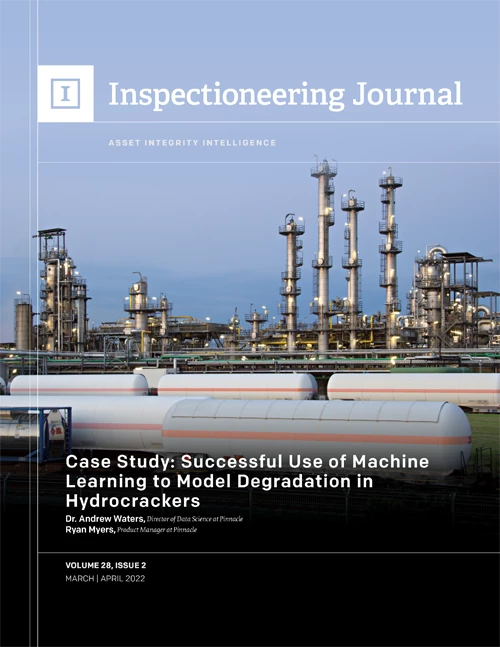Case Study: Successful Use of Machine Learning to Model Degradation in Hydrocrackers
Inspectioneering Journal, Mar/Apr 2022 Issue
Machine learning models can be leveraged – even by facilities with limited data – to strengthen areas of natural human limitations when predicting degradation rates.
Pinnacle recently completed a study on a hydrocracker unit that compared the degradation rates predicted by a machine learning model to industry standards. The study found that the machine learning model was able to predict degradation rates more accurately and with a smaller margin of error compared to current industry practice.
There are three primary takeaways from the article:
- API RP 581 corrosion estimates tend to be conservative (by intent), which can make it appear easy for a machine learning model to outperform API RP 581 rates in terms of overall accuracy. However, a previous study that compared degradation rates in a reformer unit also found that machine learning-based methods outperformed an actual human subject matter expert (SME) tasked with providing accurate degradation rates.
- While the machine learning methods explored in the study were shown to be more accurate than the SME-assigned rate, these models should not be considered as a replacement for the SME. The expertise that a qualified SME brings to the process of estimating degradation rates is irreplaceable and machine learning serves as a potential aid to the SME in their work.
- The machine learning model will produce results that are specific to the facility that was used to train it. However, the general rules learned by the model regarding how individual variables affect degradation rates will transfer to any facility. The model is capable of quickly calibrating to a new facility with only a small amount of data and naturally improves over time as it observes more data to refine its rules and predictive capabilities.
Read the full article to learn how data science can be used to solve reliability problems faster and more accurately than current industry practices.

Stay in the know.
Providing data-driven insights, perspectives, and industrial inspiration from the forefront of the reliability transformation.